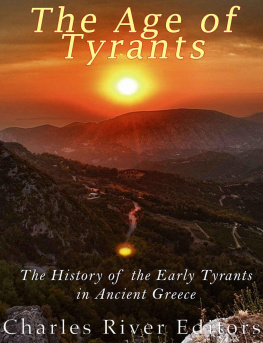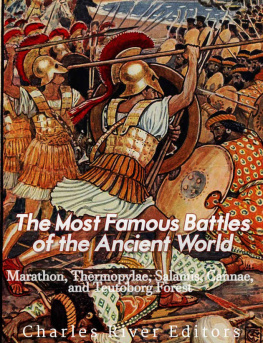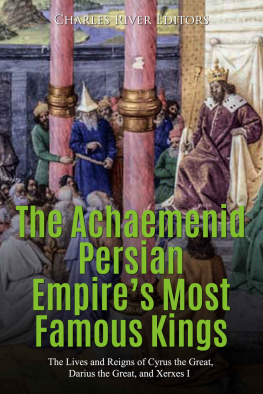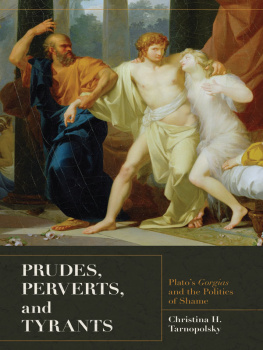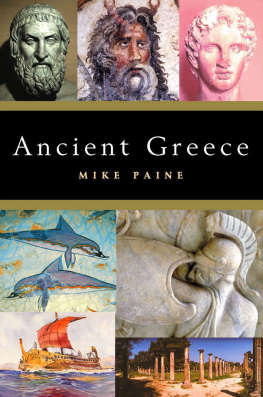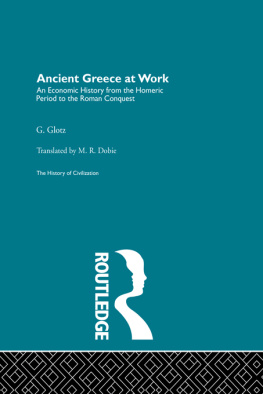Charles River Editors - The Age of Tyrants: The History of the Early Tyrants in Ancient Greece
Here you can read online Charles River Editors - The Age of Tyrants: The History of the Early Tyrants in Ancient Greece full text of the book (entire story) in english for free. Download pdf and epub, get meaning, cover and reviews about this ebook. year: 2016, publisher: Charles River Editors, genre: Art. Description of the work, (preface) as well as reviews are available. Best literature library LitArk.com created for fans of good reading and offers a wide selection of genres:
Romance novel
Science fiction
Adventure
Detective
Science
History
Home and family
Prose
Art
Politics
Computer
Non-fiction
Religion
Business
Children
Humor
Choose a favorite category and find really read worthwhile books. Enjoy immersion in the world of imagination, feel the emotions of the characters or learn something new for yourself, make an fascinating discovery.
- Book:The Age of Tyrants: The History of the Early Tyrants in Ancient Greece
- Author:
- Publisher:Charles River Editors
- Genre:
- Year:2016
- Rating:5 / 5
- Favourites:Add to favourites
- Your mark:
The Age of Tyrants: The History of the Early Tyrants in Ancient Greece: summary, description and annotation
We offer to read an annotation, description, summary or preface (depends on what the author of the book "The Age of Tyrants: The History of the Early Tyrants in Ancient Greece" wrote himself). If you haven't found the necessary information about the book — write in the comments, we will try to find it.
*Includes ancient accounts of the tyrants
*Includes online resources and a bibliography for further reading
*Includes a table of contents
States are as the men are; they grow out of human characters. Like State, like man. Plato, The Republic
Tyranny in ancient Greece was not a phenomenon limited to any particular period. Tyrants could be found in power throughout Greece, ruling poleis from the 7th century B.C. right through to the 2nd century B.C., when Roman domination effectively put an end to this form of government throughout the Hellenistic world. That said, the heyday of tyranny was undoubtedly the 7th and 6th centuries B.C., and it is in this period, known as the Age of Tyrants, that large numbers of tyrannies arose, particularly in the Peloponnese. The Age of Tyrants ended on the Greek mainland with the expulsion of the Peisistratidai in 510 B.C., but it continued in other parts of the Greek world, particularly in the Greek cities of Sicily, where tyranny did not finally end until the removal of Dionysius II of Syracuse in 344 B.C. In Asia Minor, tyranny survived the Persian conquest until the days of the Roman conquest.
The governments of the majority of the Greek states in the Archaic and Classical periods were in the hands of local aristocrats, and it is a modern preoccupation with the Athenian democracy or Spartas unique system that has tended to obscure this fact. Oligarchy was the norm, and political power derived from wealth and birth. As the wealth of city states grew, so, too, did the number of citizens who, despite personal wealth, found themselves outside the very limited aristocratic elite that conspired to maintain the political power of the few.
These disenfranchised new men came, more and more, to resent their lack of political influence, and this dissatisfaction was fueled by the increasing use of the hoplite as the main weapon of the period, which brought all male citizens closer to each other and emphasized the interdependence that existed between individuals. The sense of camaraderie engendered a growing understanding of the potential power of the armed citizen. With that realization came the emergence of individuals who were not prepared to accept the status quo but instead were willing to exploit the discontent and the power of the citizen body to seize power for themselves. Aristotle noted that tyrants generally combined the role of a general with that of a popular leader, demagogos. To the ruling elites such a usurper was known as turannos or tyrant.
The Age of Tyrants: The History of the Early Tyrants in Ancient Greece looks at the various people, places, and reigns during a crucial part of Ancient Greek history. Along with pictures depicting important people, places, and events, you will learn about tyrants in Greece like never before.
Charles River Editors: author's other books
Who wrote The Age of Tyrants: The History of the Early Tyrants in Ancient Greece? Find out the surname, the name of the author of the book and a list of all author's works by series.

